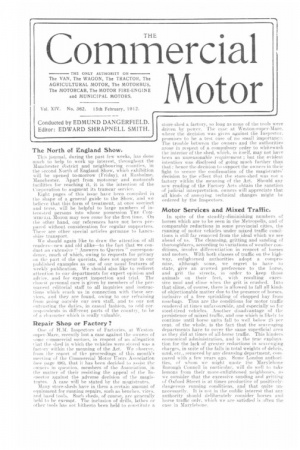The North of England Show.
Page 1

If you've noticed an error in this article please click here to report it so we can fix it.
This journal, during the past few Nvee6, has done much to help to work up interest, throughout the Manchester district and neighbouring counties,in the second North of England Show, .which exhibition will be opened to-morrow (Friday), at Busholme, Manchester. Apart from motorcar and motorcab facilities for reaching it, it is the inteution of the Corporation to augment its tramcar serviee.
Eight pages of this issue have been compiled in Ito shape of a general guide to the Show, and• we believe that this form of treatment, at once succinct and terse, will be helpful to large numbers of interested persons into whose possession THE COMMERCIAL MoToa may now come for the first time. On the other hand, our references have not been prepared without consideration for regular supporters. There are other special articles germane to Lancashire transport. We should again like to draw the attention of all readers—new and old alike—to the fact that we conduct an extensive " Answers to Queries " correspondence, much of which, owing to requests for privacy on the part of the querists, does not. appear in our published examples as one of our usual features of weekly publication. We should also like to redirect attention to our departments for expert opinion and advice, and for expert inspection and trial. The tilostisi personal care is given by members of the permanent editorial staff to all inquiries and instructions which reach us in connection with these services, and they are found, owing to our refraining trom going outside oar own staff, and to our not entrusting the duties, in casual fashion, to odd correspoedents in differentparts of the country, to be of a character which is really valuable.
Repair Shop or Factory ?
One of Ti.m. Inspectors of Factories. at Westonsuper-Mare, recently lost a case against the owners of some commercial motors, in respect of an allegation
ftit the shed in which the vehicles were stored was a. factory within t he meaning of the Act. We observe. from the report of the proceedings of this month's meet ing of the Commercial Motor Users Association (see page .196), that it has been decided to assist the owners in question. members of the Association, in the matter of their resisting the appeal of the Tnsnector against the adverse decision of the magistrates. A case will be stated by the magistrates.
Many store-sheds have in them a certain amount of tiquipment for running repairs, such a.s benches, vices. and heed tools. Such sheds, of course, are generally held to he exempt. The inclusion of drills, lathes or other tools has not hitherto been held to cousi it ute
store-shed a faeterv , so long as none of the tools were driven by puwer. The case at Weston:super-Mare. ii here the decision was given against the Inspector. promises to be a test case of DO small importanc:i. The trouble between the owners and the authorities arose in respect of a compulsory order to whitewash the interior of the shed, which, in itself, may not have been an unreasonable requirement ; but the evident intention was disclosed of going much further than that : hence the decision to support the owners in their fight to secure the confirmation of the magistrates' decision to the effect t hat the store-shed was not a factory within the meaning of the Act. Should any new reading of the Factory Acts obtain the sanction of judicial interpretation. owners will appreciate that all kinds of annoying technical changes might be taidered by the Inspectors.
Motor Services and Mixed Traffic.
In spite of the steadily-diminishing numbers of horses which are to be seen in the Metropolis, and of comparable reductions in sonic provincial cities, tile running of motor vehicles under mixed traffic conditions is still far removed from the ideal which we see ahead of us. The cleansing, gritting and sanding of thoroughfares, according to variations of weather conditions, involve differentiation in respect of horses and motors. With both classes of traffic on the highway, enlightened authorities adopt a compromise, although some, we regret to have to state, give an avowed preference to the horse, and grit the streets, in order to keep those animals on their feet, with resulting excessive mud and slime when the grit is crushed. Intl) that slime, of course, there is allowed to fall all kinds of objectionable matter due to the presence of horses. inclusive of a free sprinkling of chopped hay front nosebags. Thus are the conditions for motor traffic rendered at times -unfavourable, and especially so for steel-tired vehicles. Another disadvantage of the persistence of mixed traffic, and one which is likely to continue until horse units fall to well below ow 25 per cent, of the whole, is the fact thatthe scavengieg departments have to cover the same superficial area as they did at times of all-horse traffic. This hinders economical administration, and is the, true explanation for the lack of greater rednetions in scavenging charges, in spite of the falls in total weights of debris, mud, etc., removed by any cleansing department, compared with a few years ago. Some London authorities, of whom we might emote the Marylebone 'Borough Council in narticular, will do well to take lessons from their more-enlightened neighbours, as we consider that the excessive sanding and gritting of Oxford Street is at times productive of positivelydangerous running conditions, and that quite unnecessarily. It is not in the public interest that any authority should deliberately consider horses and horse traffic may, which we are satisfied is often the ease in Maryletame.
























